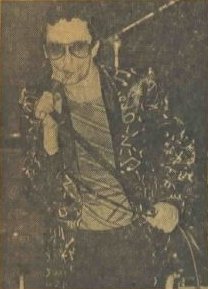POP MUSIC REVIEW
Rumour, Parker: Power Pairing
BY ROBERT HILBURN
The Rumour plays with taste and discipline, but it is capable of such force that it can all but devour most performers. Thatís what happened last year when the British group appeared at the Roxy in support of Carlene Carter, a gifted but gentle country singer-songwriter.

ON STAGE - Graham Parker at Roxy |
Parker is one of the most compelling British rock figures to emerge in the 1970s. His music combines the power and appeal of several of pop's most vital forms: the lyric emphasis or folk/country, the sensualness of rhythm and blues, the drive of rock,
When Parker made his local debut with the Rumour at the Roxy in 1976 as opening act for Richie Havens, he seemed destined for rock stardom. The fact it has taken him so long to return to the club as a headliner has more to do with the mechanics of the record business than any deficiency in his talent.
Parker became disenchanted with his first U.S. record label, Mercury, over what he felt was inadequate promotion and support. He documents that frustration in the feisty "Mercury Poisoning," a song that he sang Wednesday: "Iím a victim of Mercury poisoning/The best-kept secret in the West."
Though his lengthy (by club standards) 90-minute set also touched on songs from Parker's three Mercury albums, the heart of the Roxy performance centered on "Sparks" tunes. They bristle with the same conviction and passion that have always highlighted Parker's music, but there's even more consistency and provocation now in his lyrics.
Many of the themes reflect the strain of Parker's career, but theyíre not tied to the squabble with Mercury. The scarcasm, desire and tension in the songs speak more fully to adjusting to the hectic rock life-style.
Except for "You Canít Be Too Strong" a tender look at the anguish following an abortion, the music was as supercharged as a high-speed roller coaster and delivered over a sound system that was as loud as any in memory at the club.
While that almost oppresive volume worked on such driving numbers as "Saturday Nite Is Dead," it sometimes blidgeoned the subtler elements in Parkerís music - notably the lyrics.
Parker is a more comfortable performer now than in 1976. He moves around the stage (and even occasionally onto a table top) and punctuaded the lyrics with explanatory gestures Wednesday.
Coupled with the album, this tour should bring Parker the recognition that has long been due him. The Rumour, too, should gain a wider following - its own Arista LP is due shortly.
Opening for Parker at the Roxy is Susan, a four-piece male rock group from New England that is as plain as its name. The band mixes two potientally inviting elements: the effervescence associated with melodic pop-rockers like old Raspberries and the basic rock mechanics of a group like Bad Company. But the ingredients donít jell. "Takin It Over" has AM pop potential, but neither the live show nor the groupís debut RCA record suggests Susan is a noteworthy arrival.
From the Los Angeles Times, Friday April 13, 1979, part IV, page 18.
Back to GP article bibliography